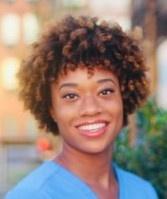
Courtney Heard, AGPCNP, knew she wanted to work in healthcare from childhood. She started taking courses in nursing as an undergraduate, and after completing her nursing degree she started as a neurohospitalist nurse practitioner. Now, as one of our newest Advanced Practice Provider residents, she’s seeing and treating patients with multiple sclerosis, epilepsy, and other neurological conditions. In this week’s Spotlight interview, Heard talks to us about the career path that drew her to neurology and our Department, her work teaching women’s health and nutrition in rural Guatemala, and her loves of gardening, backpacking, and travel when she’s not at Duke.
What are your current responsibilities as an APP resident? What does a typical day look like for you?
I started the Neurology APP Residency back in August of this year. My current responsibilities including seeing patients in clinic, taking a history, completing a physical assessment, providing patient education, discussing my plan with the patient as well as discussing the case/plan with my attending physician. When I am not in clinic, I am studying for whichever rotation I am in. So far, I have completed two rotations in general neurology and epilepsy. I just started my rotation in multiple sclerosis and neuroimmunology. I have learned so much so far and am excited to continue learning.
How and when did you first become interested in nursing?
I knew from a young age that I wanted to go into healthcare. When I started my undergraduate career at Vanderbilt University, their nursing program caught my attention. I liked that it was an accelerated program offering a fast track to becoming a RN and then a NP. I became a member of the pre nursing society at school and began taking nursing prerequisites. I took a global health course the summer of 2014 and ended up going to Guatemala that summer to volunteer at Primeros Pasos, a clinic that offers affordable health care and health education to rural underserved communities. Volunteering that summer, I educated those living in the Quetzaltenango valley about women’s health and nutrition through community events and volunteering in the clinic. It was an amazing experience. It was the first time I was able to be involved in the health care of another human being and such a privilege. Afterwards, I was set that nursing was for me.
What drew you to our APP residency program in particular?
After graduating, I began working as a neurohospitalist nurse practitioner. The service was split into primary patients and consults. Only stroke patients were admitted to the primary service. I mostly worked with the primary service and gained a lot of experience in stroke as well as post stroke care. However, occasionally, I would work with the consult service and would see consult patients. The exposure to other neurological conditions while working with the consult service is what drove me to pursue an APP residency in neurology. I wanted to gain more clinical expertise to be able to treat a variety of neurological diseases. The APP residency at Duke in particular attracted me due to the length of time it had been established as well as the variety of rotations offered. I was unable to find another neurology APP residency like this one.
What work plans do you have after you complete your residency? If you could have any job in the world, what would it be?
After completing the residency, I plan to continue practicing as a nurse practitioner. As the residency will expose me to many aspects of neurology, I may be attracted to one subspecialty in particular that I may wish to continue working in. If I could have any job in the world, I would become a full-time traveler and blog my experiences around the world.
What’s been one experience or aspect of the APP residency program that’s stood out or been valuable to you so far?
Every rotation that I have done so far has been unique. Seeing clinical conditions that I have not ever seen before has definitely stood out to me. For example, I saw a patient with amyotrophic lateral sclerosis for the first time while in my general neurology rotation. The presentation was fairly classic, and this was a major teaching point for me that I will not forget.
You majored in Spanish as an undergraduate and have worked as a translator in the past. How does this experience affect your clinical work?
I love being able to see Spanish speaking patients in clinic. So far, I have only seen two and was able to translate as necessary during their visits. From experience with my prior position as a neurohospitalist nurse practitioner, if the visit is medically complex, I do like to use an interpreter as I am not certified in medical Spanish. I am looking into pursuing my certification. I do think that being able to speak Spanish has been a great help in the past and patients light up when they realize you can speak their own language. Being able to speak Spanish also helps with communicating certain aspects of patient care that are crucial.
What other passions or hobbies do you have outside of the Department?
Outside of the department, I enjoy growing and tending to my houseplants. I have several of them. I would love to have my own garden one day when I have the time to tend to it. I enjoy hiking and backpacking. I’ve been on local hikes in NC and recently backpacked in Tahoe, California. I also love to cook and experiment with making my own recipes. I am an avid traveler and enjoy traveling both outside the country as well as within the United States.

Heard shares a masked selfie from her car.